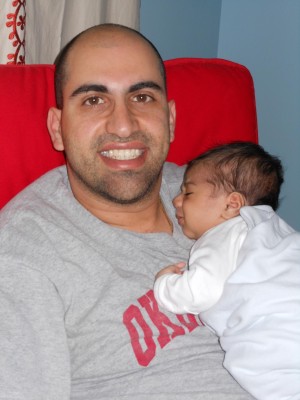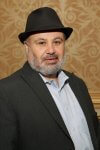University of Illinois Board formally votes to deny Salaita hiring
Is anti-Arab bias the driving factor in punishing Salaita for his opinions critical of Israel. What role does Illinois Gov. Pat Quinn play in the free speech drama and academic freedom
By Ray Hanania

The Board of Trustees of the University of Illinois at Urbana-Champaign voted Thursday to formally reject the hiring of Palestinian American Steven Salaita, confirming a decision by the University’s Chancellor to withdraw the job offer because of Salaita’s criticism of Israel on his Twitter account during the Gaza war.
The vote is viewed as a political move led by Chairman Christopher Kennedy, who is the son of former US Senator Robert F. Kennedy who was assassinated by a Palestinian immigrant Sirhan Sirhan on June 6, 1968 angered by US and Kennedy support of Israel.
The board voted 8 to 1 to formally reject Salaita’s hiring with only one board member, James Montgomery saying he had reversed his views believing that the University should accept all views no matter how intolerable. Montgomery was the Corporation Council to the late Chicago Mayor Harold Washington. Montgomery said he initially supported the job revocation joining the Board’s August 22 statement defending the job revocation but believed now that Salaita should be hired.
The board action has provoked demands that Governor Patrick Quinn, who has claimed a strong relationships with both Chicagoland’s American Jewish and American Arab communities, fire Kennedy who some believe was a driving force behind the Salaita firing.
Kennedy was outspoken in his criticism of Salaita and was quoted telling the Chicago Tribune, which described Salaita’s criticism of Israel as “hate speech,” that the University would probably settle financially with Salaita than rehire him.
“Our intention isn’t to hurt him financially,” Kennedy said in the Chicago Tribune newspaper interview. “We don’t like to see that. We are not trying to hurt the guy. We just don’t want him at the university.”
Salaita had been offered an indefinite tenured teaching position at UIUC in the American Indian Studies Program, but the job offer was rescinded after pro-Israel activists and school funders complained about Salaita’s views expressed on Twitter during the Israel-Hamas war in July and early August which were highly critical of Israel, a foreign country.
Salaita and his wife had already quit their jobs at Virginia Tech and had relocated to Champaign-Urbana to begin the job, which was subject to the approval of the Board of Trustees. The $85,000 a year position was to have started August 16, but Chancellor Phyllis Wise emailed Salaita on August 1 to inform him she was withdrawing his nomination claiming she believed it would not be approved by the board.

On Tuesday, Sept. 9, Salaita and his attorneys held a press conference at UIUC demanding that he be reinstated. They suggested a civil rights lawsuit would be filed against the University since apparently only reason for UIUC not hiring Salaita was his Constitutional Right to Freedom of Speech, which supposedly is a cornerstone of Academic Freedom at state university’s like UIUC.
Supporters of Israel have denounced Salaita’s views as “hate speech” and lobbied the board heavily. Salaita’s attorneys said in a statement that many of those supporters implied that they would withhold donations to UIUC if Salaita were hired. Palestinian supporters have defended Salaita’s views, which have criticized Israel’s for war crimes and the targeting of civilians in its seven week war against Hamas.
More than 2,000 civilians were killed including more than 500 babies, children and teenagers. Israel has argued that the civilian casualties were unavoidable because they were being used as “human shields” by Hamas militants. International Human Rights Groups across the board have rejected the Israeli claim and demanded an investigation into the conduct of Israel’s soldiers.
Yet many Americans wondered why a debate over a foreign country’s alleged war crimes has anything to do with the qualifications of an American professor to be hired or not hired by a state funded academic institution.
The Salaita appointment was on the Board’s agenda Thursday morning.
“I am disappointed in the majority of the Trustees and the action they took today,” Salaita said of the 8 to 1 UIUC Board of Trustees vote.
“Being at the school on Tuesday surrounded by so many supportive students and faculty was a professional high point for me and reinforced how rewarding it would be to work in that community. I have offered to meet with both the Board and the Administration, but not one of them has spoken with me or ever heard my side of the story. They have no reason to doubt the high standard I have always maintained in the classroom.”
Salaita added in his press release Thursday, “As I said in a less-notorious tweet, ‘I refuse to conceptualize #Israel/#Palestine as Jewish-Arab acrimony. I am in solidarity with many Jews and in disagreement with many Arabs.’ If they had cared to learn, they would have seen this and other tweets reflecting a similar sentiment. Given the Board’s vote, I am speaking with my attorneys about my options.”

Prof. Salaita is represented by Maria LaHood and Baher Azmy of the Center for Constitutional Rights, and Anand Swaminathan, Gretchen Helfrich and Jon Loevy of Loevy & Loevy in Chicago.
The University of Illinois Board of Trustees consists of 13 members, 11 who have official votes. Nine are appointed by Governor of Illinois for terms of six years, and three student trustees (one from each campus: Urbana-Champaign, Chicago, and Springfield) are elected by referenda on their campuses for one-year terms.
One of these student trustees is appointed by the Governor to have an official vote. Governor Pat Quinn serves as an ex-officio member.
Students members were not allowed to vote on the Salaita appointment.
The board chairman is Christopher Kennedy, the son of the late Senator Robert F. Kennedy who was murdered while running for president of the United States on June 6, 1968 by a Palestinian immigrant, Sirhan Sirhan, who was angry over Kennedy’s support of Israel and Israel’s year old occupation of the West Bank. The killing occurred on the one year anniversary of the June 1967 war.
American Arabs wonder if Kennedy’s vote on Thursday was related to his anger against Palestinians and Arabs. The board meeting was also held on Sept. 11, 2014, the 13th anniversary of the terrorist attacks on the World Trade Center’s Twin Towers by Arab extremists led by Osama Bin Laden.
Chronology
Sept. 2012
UIUC searches for professor for Native American Studies Program
Feb. 2013
Salaita flies to UIUC to meet with the search committee about the job
July 2013
UIUC Program Approves hire
Sept. 2013
College and Provost approve hire
October 2013
Salaita is offered a job at UIUC
July 7 – August 26, 2014
Israel and Hamas engage in a brutal war that takes the lives of 2,200 Palestinians, mostly civilians, and 70 Israeli soldiers.
August 1, 2014
Chancellor Phyllis Wise emails Salaita that she is rescinding the job offer
August 22, 2014
UIUC Board of Trustees sign statement expressing support for Salaita’s firing
Sept. 9, 2014
Salaita holds press conference demanding job reinstatement
Sept. 11, 2014
UIUC board formally rejects Salaita’s hiring by 8 to 1 vote
UIUC Board members 9 voting members
• Ricardo Estrada, appted by Quinn 2011-2017 (President/CEO Metropolitan Family Services)
• Patrick J. Fitzgerald, appted by Quinn 2013-2019 Former US Attorney for Northern Illinois and partner in Skadden, Arps, Slate, Meaghor & Flom
• Karen Hasara, appted by Quinn 2011-2017 (Mayor of Springfield)
• Patricia Brown Holmes, appted by Quinn 2011-2017 (Law Professor Northwestern University)
• Christopher Kennedy, appted by Quinn 2009-2015, Chairman Joseph P. Kennedy Enterprises Inc.
• Timothy Koritz, appted by Quinn 2013-2019, Anesthesiologist Rockford Memorial Hospital
• Edward L. McMillan, appted by Quinn 2009-2015, CEO M&A Transaction Consultants
• James D. Montgomery, Sr., appted by Quinn 2013-2019, former Chicago Corporation Council for the Late Mayor Harold Washington, Instructor University of Chicago School of Law
• Pam Strobel, appted by Quinn 2009-2015, Exec VP Exelon Corporation (which owns ComEd)
(Ray Hanania is an award winning former Chicago City Hall reporter and political columnist. He is managing editor of The Arab Daily News www.TheArabDailyNews.com.)
Related articles


- Israelisnipers shooting and killing hospital workers in Gaza - December 11, 2023
- CAIR Condemns Israeli Executions of Wounded, Unarmed Palestinian in West Bank - December 11, 2023
- Arab and Muslim American voters face a “simple choice” between Biden’s inhumanity and Trump’s edgy politics - December 9, 2023




























That’s a ridiculous political point. Salaita was criticizing Israel for murdering babies and children. More than 500 babies, infants and children were killed by heavily armed Israeli soldiers and by constant missile fire from Israel. I attended UIC and I know how biased and racist the University of Illinois administration was when I was a student and how it is today. But unlike you, I stand by my public statements and don’t hide behind anonymous postings. Comments made by anonymous posters reflects the weakness and bankruptcy of their arguments.
Students shouldn’t have to deal with a professor who pines in public for their kidnapping and murder, period. If I thought that Hirsi woman was biased against Muslims and didn’t deserve recognition from Brandeis, I sure as Hell don’t think this guy has any business in an American classroom. Maybe Mr. Hanania is unaware that U of I has foreign students from Israel. But then he doesn’t include any of the unhinged tweets, or tell readers that the university has a number of fierce critics of Israel on its faculty (hence maybe, just maybe, something else was at play here), so I doubt it.